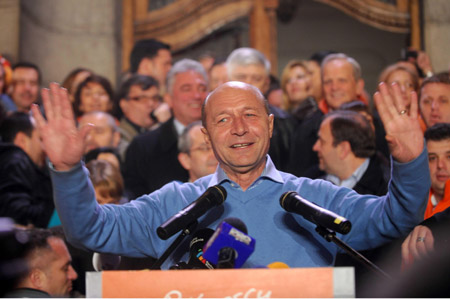Top News
Incumbent president leads in Romania's run-off
(Xinhua)
Updated: 2009-12-07 17:32
BUCHAREST: Incumbent Romanian President Traian Basescu garnered 50.43 percent of the vote in Sunday's presidential run-off, while Social Democrat leader Mircea Geoana scored 49.57 percent, showed first partial results released by the Central Election Bureau (BEC) on Monday.
The BEC announced the results after counts in 95.40 percent of polling stations.
The number of the presence to the polls being 10,229,433, namely 57.94 percent of the eligible voters. Basescu was leading by some 86,000 ballots in the run-off, according to the results.
|
|
Votes by Romanians living abroad had not yet been counted as polling stations in the United States closed early Monday morning Romanian time.
Over 147,600 Romanians cast ballots at the 294 polling stations abroad until 0500 GMT, much more than that of 90,000 in the first round of presidential elections held on November 22, according to information provided by the heads of polling stations.
In the first round, the Romanian diaspora voted in favour of Basescu.
Basescu is endorsed by the ruling Democratic-Liberal Party, while Geoana is a candidate of the Social Democratic Party-Conservative Party Alliance, supported by other parliamentary oppositions, including the National Liberal Party and the Hungarian Democratic Union of Romania.
|
||||
Other exit poller, the Company for Sociological Research and Branding (CCSB), gave Geoana a 2.4-percent lead in the presidential run-off against Basescu, while CURS exit poll put the figure at 50.8 percent to 49.2 percent in favour of Geoana. A fourth poll, by CSOP, showed both candidates at a 50-50 tie.
Romania has been in the hands of a caretaker government since mid-October, when its democrat liberal government was ousted in a non-confidence vote in parliament and Basescu failed to push through parliament his nominations for a new prime minister.
The presidential run-off election on Sunday has been widely seen as crucial for Romania. The winner will have to move quickly to name the country's new prime minister and resolve a political crisis that has led international donors to postpone a massive aid package -- the third installment of a 20-billion-euro (US$29.65 billion) bailout package led by the International Monetary Fund.








